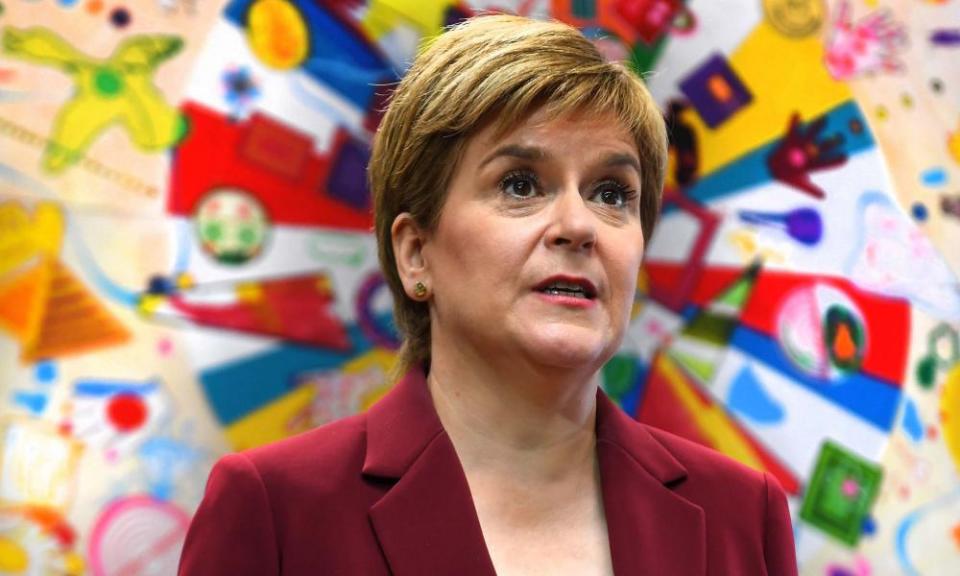Sturgeon on brink of cooperation deal with Scottish Greens

Nicola Sturgeon is on the brink of signing a deal with the Scottish Greens that would cement a pro-independence majority at Holyrood and may see the Greens taking ministerial seats.
The Guardian understands a final agreement is close to being signed, with preparations under way to put the deal to Sturgeon’s cabinet as early as next Tuesday.
The formal deal, which will stop short of a full coalition of the kind agreed by the Conservatives and Liberal Democrats under David Cameron and Nick Clegg in 2010, would give the Scottish National party and Scottish Greens a clear majority of seats at Holyrood.
It would allow the first minister to present a strong pro-climate agenda in advance of the Cop26 climate talks in Glasgow this November, and outvote anti-independence parties in Holyrood.
Sturgeon currently leads a minority government after the SNP won 64 of Holyrood’s 129 seats in May’s elections, leaving her one short of an outright majority. The pro-independence Greens hold seven seats, giving a putative SNP-Green alliance a comfortable cushion.
It is understood nearly all the key policy discussions, around areas such as spending, climate, conservation, transport and local government, are close to being agreed. One source said the two sides “were 95% there, but the last few percentage points are the hardest”.
It would be the first time after 14 years in power the SNP had signed a formal deal with another party: Alex Salmond, the former first minister, frequently brokered policy-by-policy deals with the Tories and Greens after narrowly winning power in 2007 by a single seat. Since then the Greens have most often done deals to pass SNP budgets at Holyrood.
The biggest remaining hurdles are around collective responsibility and setting out how much freedom the Scottish Greens have to disagree with Scottish government decisions, including opposing them in parliament.
The deal could allow the Greens to criticise Sturgeon’s stance on North Sea oil exploration, with pressure mounting on the Scottish government from climate campaigners to oppose the proposed Cambo oilfield development 77 miles north-west of Shetland.
The Scottish government, which has previously refused to endorse Green demands for an end to North Sea exploration and drilling, has indicated it will not oppose Cambo’s approval. Scottish government officials argue that since UK ministers control oil licensing, Sturgeon cannot change that decision.
Lorna Slater, co-leader of the Greens, who has been closely involved in the talks, demonstrated outside the UK government’s offices in Edinburgh in protest at a decision to approve Cambo. Before May’s election, the Scottish Greens said Sturgeon “had to get serious on the climate emergency” in order to agree a deal.
Shell estimates the Cambo development will produce 164m barrels of oil, emissions equivalent to running 16 coal-fired power stations for a year. Greenpeace says that will heavily undermine the UK’s and Scotland’s efforts to meet challenging net zero targets.
Failing to agree a firm commitment from Sturgeon’s government to end North Sea oil drilling could anger Scottish Green party members. Under the Green party’s rules, its members must approve a Holyrood deal at a special conference before it can come into force.
The deal will present Scottish Labour, currently Holyrood’s third-largest party, with a significant political challenge. It is likely to give Sturgeon a resilient centre-left majority and removes her need to seek deals with Labour to get policies through the devolved parliament.
Labour’s leaders believe the deal could come under intense strain, however, if the Scottish Greens begin clashing with Sturgeon and other SNP ministers over policies and spending.
It could increase pressure on Labour to work closely with the Liberal Democrats, now Holyrood’s smallest party, in attacking government policies. Labour and the Lib Dems ran Scotland’s first two devolved governments in formal coalitions in 1999 and 2003.
Perhaps because word of an impending deal has filtered down to Whitehall, the Conservatives are taking a softer line on the potential for a fresh independence referendum, in a clear shift away from Boris Johnson’s original refusal to countenance such a vote.
Michael Gove, the Cabinet Office minister, told the Sunday Mail at the weekend that “the principle that the people of Scotland, in the right circumstances, can ask that question again is there”.
Recent opinion polls show support for independence has again fallen to below 50%, partly driven by public support for the UK government’s vaccination strategy.

 Yahoo Movies
Yahoo Movies 